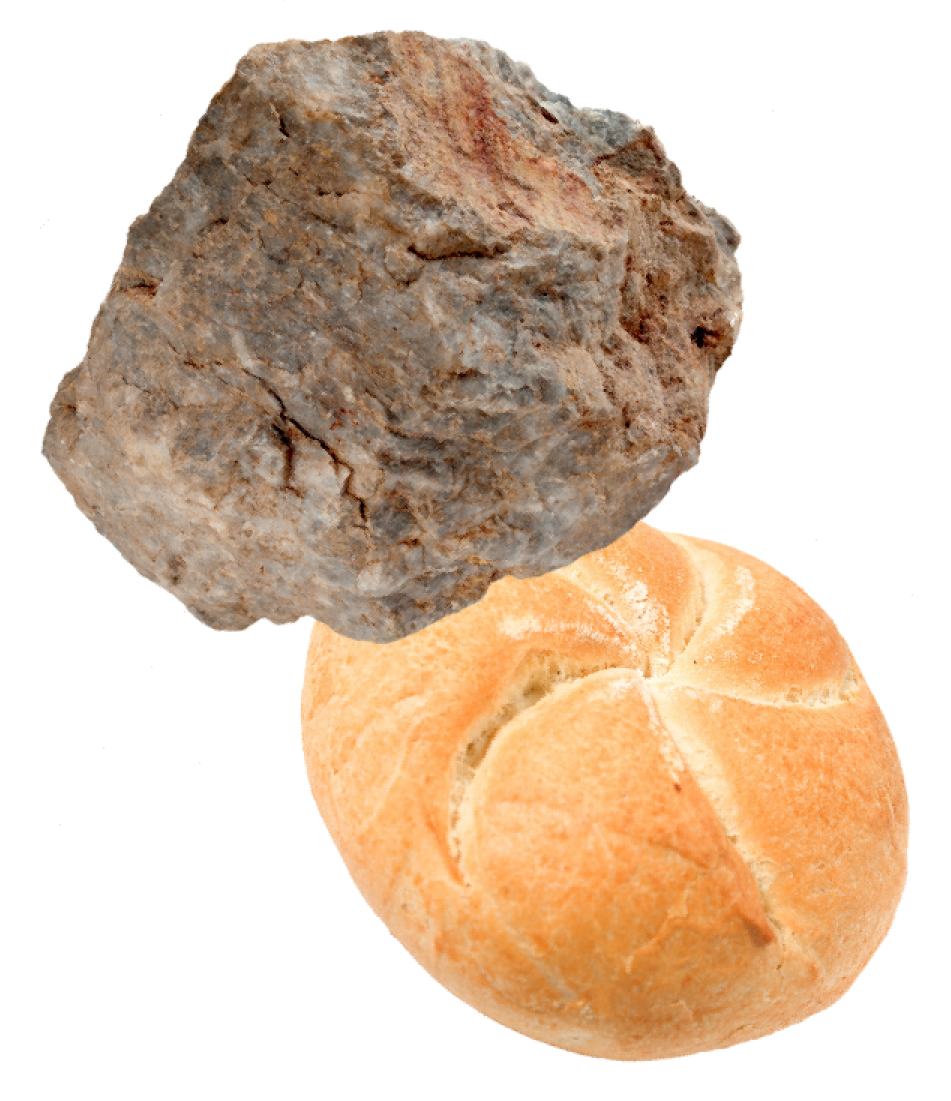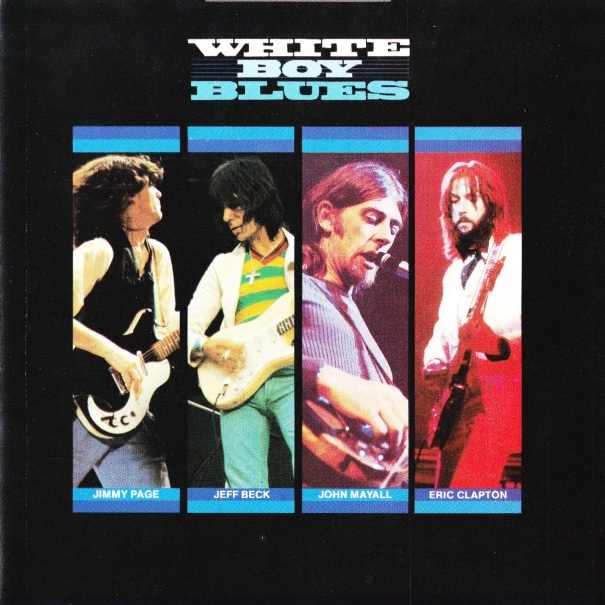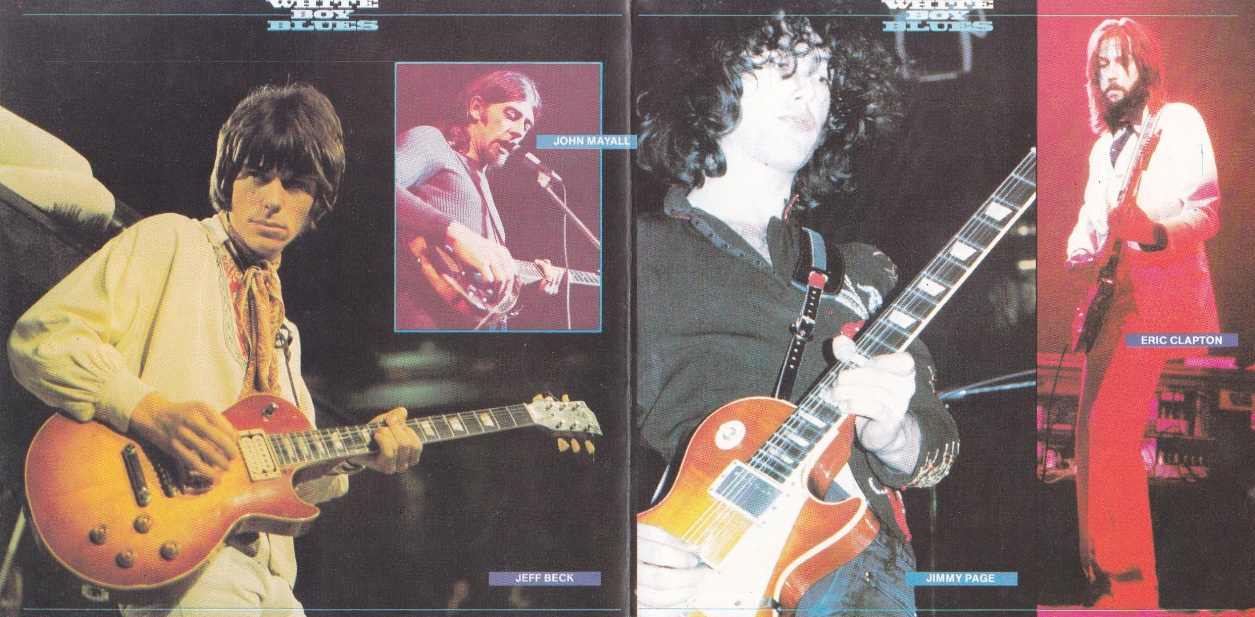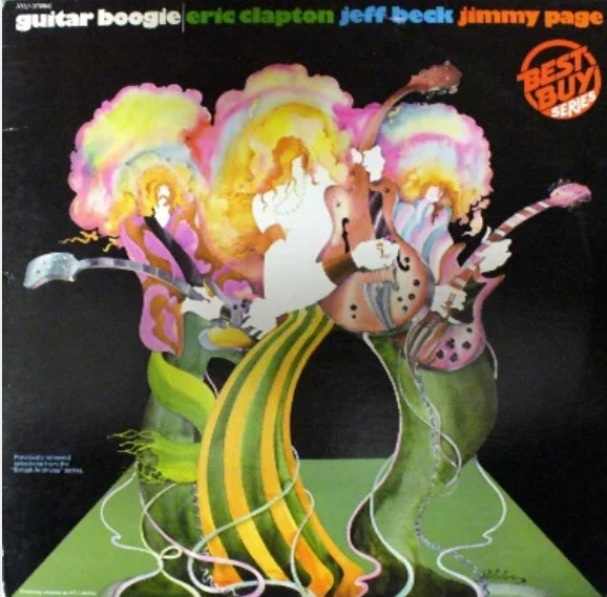
Eric Clapton & Jimmy Page Jamming
Early Collaboration & Blues Jams Unearthed by Rock Anthropology
CURATED BY INTERNATIONALLY RECOGNIZED ROCK JOURNALIST JIM ESPOSITO
Rock Anthropology

The Immediate Sessions
Guitar Boogie &
White Boy Blues

Blues Jams
Eric Clapton, Lead Guitar
Produced by Jimmy Page
(Playing Rhythm)
Mick Jagger on Harp
Bill Wyman (Bass)
Charlie Watts (Drums)
Ian Stewart (Piano)
Special Appearances
Jeff Beck, John Mayall,
Nicky Hopkins

Some real Rock Anthropology here. In 1965 John Mayall and his band, The Blues Breakers, featuring guitarist Eric Clapton, who’d left the commercially successful Yardbirds because he wanted to play The Blues, got a deal with Immediate Records, which was owned by The Rolling Stones’ manager Andrew Oldham, to record a single: “I’m Your Witchdoctor” and “Telephone Blues.” They went into a studio session overseen by Immediate’s new in-house producer, Jimmy Page.
One Session, according to Jimmy’s website, was August 17th, another on the 22nd of September. This was the year preceding Mayall’s (and Clapton’s) seminal “Beano” album, which was recorded in May of 1966.
What makes this a historical confluence of karmic proportions: besides the session itself, Clapton and Page got together after hours in the home studio of Jimmy's house to have some fun, jam, recording loose 12 bar blues. An academic gold mine, you hear two monuments of rock guitar working on licks, getting their chops down.
We first got onto these recordings in the Seventies when we found an LP called White Boy Blues, though the most notable collection of this material was entitled Guitar Boogie.
Jimmy spoke about what happened to Pete Frame for his 1974 book: The Road to Rock: A ZigZag Book of Interviews:
“That (Blues Anthology Immediate LP) was a real tragedy for me. I got involved with Immediate, producing various things, including John Mayall’s ‘Witchdoctor,’ ‘Telephone Blues’ and a couple of others (around late 1965) and Eric and I got friendly and he came down and we did some recording at home, and Immediate found out that I had tapes of it and said they belonged to them, because I was employed by them. I argued that they couldn’t put them out because they were just variations of blues structures, and in the end we dubbed some other instruments over some of them and they came out – with liner notes attributed to me (on earlier copies) though I didn’t have anything to do with writing them. I didn’t get a penny out of it anyway... Stu from the Stones was on piano, Mick Jagger did some harp, Bill Wyman played bass and Charlie Watts was on drums.”
Amazing. Perhaps the one phrase which resonates is “variations of blues structures.” These are the Founding Fathers of Rock, when they were young, before they were really famous, getting together at Jimmy’s house to screw around, play a little music. Not to make money, produce a commercial product. Just art for the sake of art.
As for the tracks:
Watch on YouTube
I'm Your Witchdoctor
John Mayall & The Blues Breakers
Featuring Eric Clapton
1965
“I’m Your Witchdoctor” is frankly so-so. Mayall had an eclectic repertoire, especially fond of upbeat funky style blues. “Witchdoctor” features scat-like rhythm licks accentuating vocals, and one piercing guitar note, serves as more or less a theme through the tune. This was early in his career, one of his first recordings, but it does foreshadow the musical direction Mayall would later take. As a song, it would be pretty far down our list. However, its historic and cultural significance, being the impetus that begat these sessions, cannot be overstated.
Though it is the B-Side of the Single, looking back “Telephone Blues” is a far more historically significant recording. This is probably the first slow-blues Eric Clapton ever recorded, unless you count “Five Long Years” off Five Live Yardbirds, which was still a touch quicker in tempo. “Telephone Blues” is a monster, 3:54 long, half of it a Clapton guitar solo. Freaking great work. His intro licks and fills are also excellent. Probably because of the jamming and rehearsals at Jimmy Page's house.
Watch on YouTube
Telephone Blues
John Mayall & The Blues Breakers
Clapton's First Slow Blues on Record?
1965
Those are the two songs they went into the studio to cut, but the heart and soul of these sessions are the simple blues jams. Most of these feature Clapton playing lead and Jimmy playing rhythm, typically a simple 12-bar blues.
According to Jimmy’s website, the first session was August 17th, during which they cut “Draggin’ My Tail,” “Snake Drive,” “West Coast Idea” and “Choker.” Which are the Blues jams. “Witchdoctor” and “Telephone Blues” were reportedly recorded on September 22nd. Makes it sound like like they got together at Page’s home studio to jam, have a little fun, then got down to business.
Watch on YouTube
Draggin' My Tail
Eric Clapton & Jimmy Page
1965
“Draggin’ My Tail” is almost certainly Eric Clapton playing lead over Page’s rhythm guitar. Staggering to even imagine. Four times through the standard 12-bar blues progression. Referencing Jimmy’s quote from 1974, it is therefore Mick Jagger on harp, Ian Stewart on piano, Bill Wyman on bass and Charlie Watts on drums. Not a bad back-up band. Just hanging out and jamming in Jimmy’s home studio at his house on Miles Road in London. You want Rock History? Here it is, man.
“Snake Drive” is another medium tempo standard 12-bar blues with Eric Clapton soloing over Jimmy Page’s rhythm. So many licks here sound so familiar.
Watch on YouTube
Snake Drive
Eric Clapton & Jimmy Page
1965
Watch on YouTube
West Coast Idea
Eric Clapton & Jimmy Page
1965
“West Coast Idea” is a slower “riff” blues. An obvious nod to the West Coast Blues of T-Bone Walker. Don’t hear a drummer or a rhythm guitar, the track is carried by a bass, with a harp and a piano in the background. We can buy that’s Mick Jagger and Ian Stewart, but we’re not so sure that sounds much like Bill Wyman on bass.
This demonstrates what Students of The Blues these young men were, even back them, to differentiate the West Coast style of T-Bone Walker from the Chicago Blues which wasy their primary inspiration.
“Choker” is an upbeat number with two guitars, only 1:18 long. Of all the tracks this sounds like Page might actually be prominent. There’s a couple riffs where the main guitar hits the same note twice in rapid succession. And around 1:07 the guitar settles into a rapid little repeating riff. These techniques are more indicative of Jimmy’s style than of Eric’s. In addition, through these sessions, it sounds like Clapton’s still playing an ES-335, with that fat, round tone of a semi-hollow. Jimmy was playing a Telecaster back in those days, and the main guitar in “Choker” has that sharp, searing attack sounds more like a Telly.
Watch on YouTube
Choker
Eric Clapton & Jimmy Page
1965
Watch on YouTube
Miles Road
Eric Clapton & Jimmy Page
1965
“Miles Road,” “Freight Loader” and “Tribute to Elmore” are not cited on the Jimmy Page website but were almost certainly recorded during these sessions. Clue Number One: Jimmy’s home studio was in his house on Miles Road.
Some stories mention how Eric and Jimmy were fooling with different sounds, some distortion. They seem to be talking about “Miles Road.”
A tantalizing guitar duel in this number, Jimmy playing a single note intro. Check out Page’s flourishes transitioning from one bar to the next. Throw in the distortion. Now listen to “You Shook Me” off Led Zeppelin I.
Perhaps our favorite, and one of the most academically interesting tracks from the Immediate Sessions. Standard 12-Bar Blues once again from Page’s home studio, with Jimmy playing rhythm so Eric Clapton can practice his blues licks. “Freight Loader” really foreshadows where Clapton was heading: that slow, dreamy flowing lead. A couple months later John Mayall & The Blues Breakers went into the studio to cut their seminal “Beano” album. Listen to the guitar through “Ramblin’ On My Mind” on this album. Tell me Eric’s not polishing up those licks here.
Watch on YouTube
Freight Loader
Eric Clapton & Jimmy Page
1965
Watch on YouTube
Tribute to Elmore
Eric Clapton & Jimmy Page
1965
Of all the tracks Page and Clapton cut during these Immediate Sessions “Tribute to Elmore” had to be the most fun. Elmore James was a huge influence on these early Guitar Gods. With good reason. Elmore invented that sliding double stop thing, though many people give the credit to Chuck Berry. Guitarists (and especially slide guitarists) went to school on Elmore and then Chuck. Not necessarily in that order.
Note this Clapton and Page song is named “Tribute to Elmore.” In 1973 Roy Buchanan released “Tribute to Elmore James” on his Second Album, which is incredibly hot, perhaps the best blues instrumental ever recorded. Think about the songwriting credits, however. Buchanan adds the “James” because he doesn’t want to pay royalties to Clapton and Page, who are listed as songwriters for “Tribute to Elmore.” But they’re all copping licks from Elmore James. Not that it mattered much to Jimmy and Eric, because Immediate supposedly didn’t pay either one of them a dime. According to some stories, Clapton felt Page had tricked him, betrayed him, and it created hard feelings between them.
Hard to condemn anyone for greed, since if it was not for the ruthlessness and greed of cutthroat execs at Immediate Records, probably Andrew Oldham, we might never have heard these incredible tracks.
The Jeff Beck & “The Allstars” Tracks
Both these compilations also include tracks attributed to “The Allstars” with Jimmy Page and Jeff Beck. These were the Cyril Davies Allstars. A vocalist and harp player who first came to prominence in the Alexis Korner Blues Band, one of Britain’s foundation R&B combos, dating back to the early Sixties, Cyril Davies recorded a couple singles for the Pye label in 1963, died in 1964 from pleurisy and endocarditis. The Allstars’ piano player was Nicky Hopkins, who later played for The Stones. Davies was replaced by Long John Baldry, another seminal name in early British Blues, calling themselves “The Hootchie Coochie Men.”
In his 1974 interview, referring to the “Allstars” tracks, Jimmy explained:
“They were tapes Immediate had from a long time before. It was in fact the Cyril Davies All Stars without their guitarist, and they were just tracks we had done for fun after the real session was over.”
Of these cuts, “Chuckles” is the standout, an upbeat shuffle which gives Jeff Beck a chance to flash on guitar, the way he did early in his career, before he became that perfectionist technician. Beck does some great Chuck Berry type licks, and Nicky Hopkins gets 24 bars to show off his piano.
“Steelin’,” featuring Jeff Beck, is another standout. Three times through the standard 12-bar blues progression, Beck plays one of his earliest performances on slide guitar for the first and third. Nicky Hopkins gets the second.
The two tracks with Jimmy Page and the Allstars are actually kinda jazzy. “Down In The Boots” is slightly up-tempo cool jazz featuring the bass, drums and piano, Jimmy does get a great little 30-something second solo starting around 2:15.
“L.A. Breakdown“ is real jumping jazz, a fast number, but once again Page gets another 30 second solo, starting around 1:03. As in the previously mentioned tune, it’s rather interesting to hear Jimmy doing some jazzy kinda guitar.
Guitar Boogie (or White Boy Blues) is not the slickest, most polished blues you’ve ever heard. That’s the whole point. These are rough early works by future virtuosos. Jimmy Page called them rehearsals. But for true connoisseurs of Classic Rock, this collection, these sessions, represent a moment in time at which we can only marvel.
One of the truly great things about being a Rock Journalist back in the day wasn’t seeing the big shows and slick concerts, but being there when these musicians were relaxed, jamming around. Slick is great, but witnessing first hand some of the spontaneous music created was an indescribable thrill. Watching Elvin Bishop jam all night in a French Quarter bar. Sitting across from Bob Seger backstage when he picked up an acoustic guitar, started strumming the intro chords from “Night Moves” two years before it was released. (Was he working on that tune, or did he write it right in front of me?) Hanging out in The Knack’s dressing room as they gleefully played “Name That Oldie.” (Absolutely the best “backstage” band in Rock History. Topping even Brownsville Station.) Watching B.B. King’s back-up band jam through sound check, knowing it was the best music you’d hear all night. Want a recorded example? Check out a famous little track called “Greeny” that Peter Green and Fleetwood Mac simply improvised, supposedly not knowing they were being recorded.
And before we depart, having previously mentioned Long John Baldry, we also recommend you check out his album It Ain’t Easy. One side is produced by Rod Stewart, the other by Elton John, who both came up through Baldry’s group.
YouTube Playlist of Jimmy Page's Session Work
YouTube Playlist, Jimmy Page Session Work
Go to Jimmy Page's Website
Jimmy has a webpage which lists his session work.
Jimmy Page Discography Sessions
Classic Rock Updates
Sign Up For Our Email List!
Receive a Notification When New Content Is Posted
Email Your Email Address to jim.classicrockforever (at) gmail.com
We do not SPAM. You will receive one email every week or two.
We will never sell your email address and you can easily unsubscribe at any time.
Help Support Our Site
Shop Amazon through Classic Rock Forever
Amazon.com
Click on Link, go to Amazon, search for whatever you want. We'll get credit.
Classic Rock Updates
Sign Up For Our Email List!
Receive Notification When New Content Is Posted
Email Your Email Address to
jim.classicrockforever (at) gmail.com
We do not SPAM.
You will receive one email every week or two.
We will never sell your email address and you can easily unsubscribe at any time.
Help Support Our Site
SHOP
Amazon.com
through
Classic Rock Forever
Amazon.com
Click on Link above, go to Amazon, then search for whatever you want.
We'll get credit.
Make Sure You Visit
Our Friends at
The Ultimate Online Library of Classic Rock Journalism
Over 40,000 Articles
The World's Biggest Archive of Stories, Interviews & Reviews
From Allmans to Zappa
Rock's Baclpages
Listen To Audio
Jim Esposito's
Explosive Interview
with
Ritchie Blackmore
Deep Purple's Somewhat Tempermental Guitarist Dumps The File in 1973
Blackmore
“Second Best Interview in Rock ’n Roll History”
Grace Slick
Rambles On
(And on and on
and on and on...)
Grace Slick
The funniest book you'll ever read!
High in The Sky Over Florida
Very High
by Jim Esposito
“Like the weirdest guy I ever met.”
– Grace Slick
Available Now on Amazon!
High Fliers